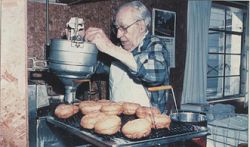Fr. Joseph Valine, the 'doughnut priest,' raised the faith in southern and central Utah

How can doughnuts help propagate the Gospel? The question would stump most of us, but the answer was perfectly clear to Father Joseph H. Valine, OP (1897-1992). For 51 years that "simple and holy man," as Bishop Weigand called him, brought the sacraments to sparsely populated rural parts of the diocese, mostly in central and southern Utah, through parishes and missions that he himself created. Contributions placed in the collection baskets among those widely scattered Catholics generated such little income that Fr. Valine largely supported himself and his ministries by his own efforts – farming, then a catering business, and finally selling doughnuts. Born in the Azores, an island chain in the North Atlantic, Fr. Valine was educated in the United States’ Midwest and in California, where he was ordained for the Dominican Order in 1929. He served in various parishes in California and Oregon before being sent to Utah on the fateful date – Dec. 7, 1941 – when the Japanese attacked the American naval base at Pearl Harbor, Hawaii. One charism, or defining feature, of the Dominican Order is community life, so one rarely sees a Dominican ministering or living alone. But Fr. Valine had the heart of a missionary and felt a calling to bring the Gospel to parts of Utah that had never enjoyed even one resident priest and certainly could not afford a community of even two Dominicans. His determination was a godsend to Bishops Duane G. Hunt, Joseph L. Federal, and William K. Weigand, who longed to provide a ministry to those isolated Catholics but had too few priests available to do it. Bishop Hunt first sent Fr. Valine to Logan, where he became pastor of Saint Thomas Aquinas Parish and built his first Utah church. (Perhaps not coincidentally, St. Thomas Aquinas is a Dominican saint.) From there he ministered as well to Catholics in Brigham City (which became Saint Henry Parish) and Corinne. In 1946 he began the ministry for which he was most famous, in central and southern Utah, when he built Saint Elizabeth Catholic Church in Richfield, and Saint Bridget in Milford. While in Milford, he also built the churches of Saint Christopher in Kanab, Saint Dominic at Bryce Canyon, and Saint Michael (now Saint Gertrude) in Panguitch. It was a record that few, if any, priests equaled in Utah history. He also established a tradition of wandering priests in that part of the diocese, like Monsignor Michael Winterer and Monsignor Robert Bussen, former and current pastors of Christ the King Parish in Cedar City, with its four missions. These priests regularly put 40,000 miles on their cars every year. St. Christopher must have been Fr. Valine’s constant companion, because despite the beat-up cars the frugal priest insisted upon driving, he never had so much as a flat tire. Frugality may have been a necessary virtue, but the priest still had to have an income. For his church-building projects, he received much help from the Catholic Extension Society, but the slim pickings in the collection plates did little to provide for his own needs. For that, he ran two alfalfa farms, of 200 and 40 acres, from which he supplied local dairy farmers. When advancing age made that too taxing, he began a catering business (he was said to make a mean spaghetti sauce). Eventually, though, he discovered a used doughnut machine and a new "hobby," as he called it. Rising at 6 a.m. each Saturday, he would make as many as 15 dozen doughnuts, which he would then peddle to travelers at Milford’s railroad station and to his own parishioners after Sunday Mass. Asking his customers to pay whatever they thought the doughnuts were worth, he often brought in a substantial take over a weekend. Even as his health deteriorated, Fr. Valine doggedly continued his ministries, giving up some of his parishes and missions only after stern orders from Bishop Weigand. The great Dominican missionary priest died with his boots on. "Death," said Bishop Weigand in his eulogy, "was the only retirement he would accept."
© Copyright 2025 The Diocese of Salt Lake City. All rights reserved.

Stay Connected With Us